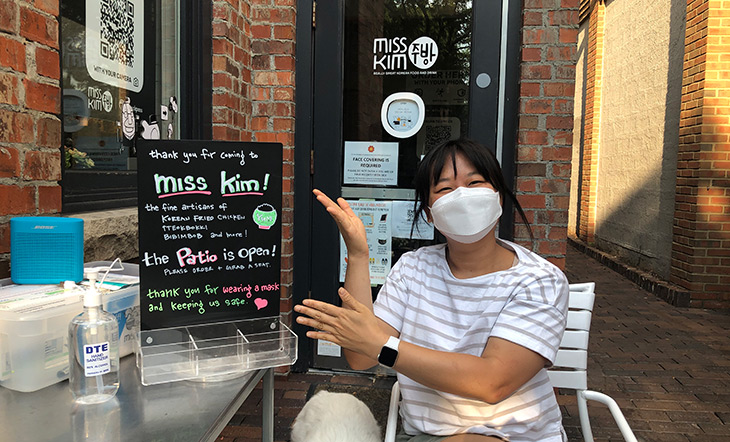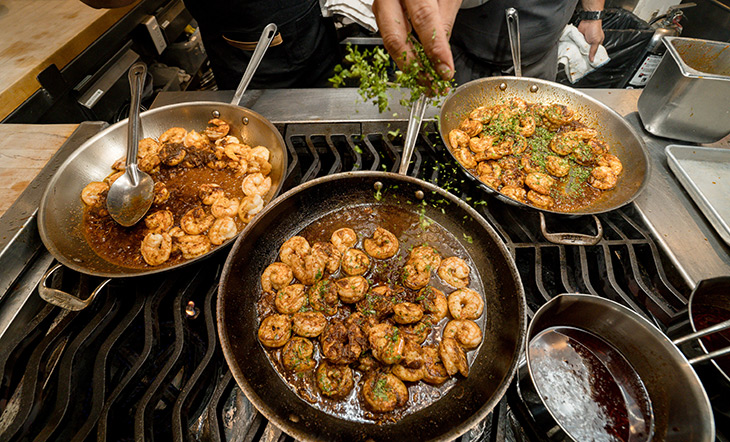Why Hospitality Needs to Extend to Both Guests and Staff
When it comes to customer conflicts in a pandemic, let your values be your guide
Ji Hye KimFebruary 24, 2021

Our industry is in crisis. The COVID-19 pandemic has already permanently shuttered 17 percent of restaurants nationwide, forced millions into unemployment, and left chefs, owners, and workers struggling to imagine what the future looks like in the near- and long-term. As states move from reopening to returning to restrictions on dining and the industry continues to try to adapt, we're sharing stories from the front lines of businesses reacting to this new landscape.
Below, Ji Hye Kim, chef/owner of Miss Kim in Ann Arbor, Michigan, shares her strategies for handling challenging guests and balancing the need for business with the need to protect her staff. In a time when keeping the lights on is a daily struggle, it becomes exceptionally hard to navigate the tension between prioritizing public health and "the customer is always right."
--
It’s a breezy summer evening. The outdoor tables are nearly full, and the energy is high. Then a well-dressed couple knocks on the door asking for a table. They are not wearing masks.
Scenes like this are playing out across the country. When the pandemic hit and Michigan restaurants shut down, my restaurant, Miss Kim, pivoted to online ordering and takeout. When outdoor dining was allowed, we opted to limit contacts by using QR codes instead of full service. When limited indoor dining was allowed, we stuck to outdoor only. Choices like these can leave some customers dissatisfied or even insistent that we change our policy.
Normally restaurant folks are really skilled at dealing with unusual demands and requests. We find out what our guests want and do our best to get it for them. If someone is unhappy, we fix it and even thank them for bringing it to our attention. We’re so good at it, we don’t even call disagreements with customers “conflicts”—it’s simply part of our job to provide great service and warm hospitality.
Except now we are in a pandemic.
It’s not like the restaurant industry is a paragon of employee wellness. From low pay, no benefits, and subpar tipped minimum wage to inequity, sexual harassment, racism, and mental health issues, we’ve had our struggles even before the pandemic. My restaurant has been conscientious in providing benefits and a living wage for our county, removing tipped minimum wage, and sticking with one fair wage for all staff. Nowadays we think a lot about staff physical and mental health and safety, and let that guide our decisions.

When the unmasked couple ask for a table, I step in so my staff doesn’t have to engage with a situation that might be difficult to navigate, unsafe, and scary. Even though I empower my employees to deal with guest interactions, at the end of the day, I’m the owner and chef. I can make a quick decision in an intimidating moment. The whole team is very aware that, only a few weeks into the first state mask mandate, a security guard at a store in a nearby county was shot and killed just for asking a patron to wear a mask. Ann Arbor is a laid-back, liberal town, but it weighs on us.
I introduce myself to the couple and lead them outside, keeping at least 6 feet between us. I gently let them know that there is no indoor dining, but offer them an outside table. The man asks if they’d have to wear masks, since he finds them useless.
I remind myself that we want the same things: to enjoy the food and have a good time. And right now, I could really use the sales if we can do it safely. I hold out hope that we’ll find common ground.
I tell them that as long as they’re sitting down and eating, the state guideline says masks aren’t required. I crack a joke: it would be hard to drink the wine and eat the buns with a mask on! They laugh, and the woman shares that it’s their anniversary and first night away from their newborn. They want the night to be special and I can understand that. So, I find them a quiet table, a bit more tucked away from everyone else. I decide to break our rule and provide full service. They made a concession to dine outside, I can make a concession to serve them myself, and with enough space, I feel safe doing so.
I walk them through the menu. They love the food, drink a bit too much wine, and leave very happy. Before they leave, they give me a written list of suggestions and say they’re going to tell all their friends to come. Although I’m tempted to roll my eyes, I’m actually appreciative of their suggestions—there are a couple of constructive ones, and they didn’t have to put time and thought into giving us feedback. I’m grateful that their visit will help us survive.

We in the service industry are often asked to be the bigger person. We yield, knowing that customers aren’t always right; we do our best to empathize; we practice patience and generosity. I tried to imagine wanting to have a nice night out with my loved one and escape the work of being a new mother in a pandemic for one evening. Instead of seeing the guests themselves as the source of conflict, I tried to find a solution that works for everyone.
The real challenge comes when what a guest wants conflicts with our values. Had those guests insisted on coming inside the restaurant without a mask, it would have been a very different story. Even the solution of seating them outside and providing full service only worked because it was within state guidelines, we could social distance, and because I personally took on the risk and responsibility of serving them. Had they insisted on putting everyone at risk, the conflict might have escalated, and I would have politely refused service. Restaurants have always been a part of public health whether or not people recognize it. With the health risk being so high now, it’s more imperative than ever to take on conflicts like this. Doing so protects our staff and our guests.
When there is a conflict that I cannot resolve with empathy and resourcefulness, I turn that empathy inward and consider our values. Service is an honorable profession, but we’re not subservient, and we should be hospitable to our own, too. I rely on our values and principles to set boundaries, make decisions, and choose battles. Independent business owners have always found this balance, though we are asked to do so much more in this new reality. Care and empathy can help navigate and resolve most conflicts, but when conflicts violate your principles and risk safety, I think it’s okay to stick to your guns.
--
Ji Hye Kim is the chef/owner of Miss Kim's in Ann Arbor, Michigan. Learn more about her restaurant at misskimannarbor.com.






